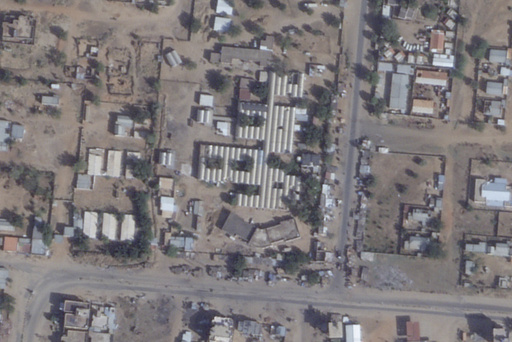DUBAI, United Arab Emirates — Approximately 70 individuals lost their lives in a recent assault targeting the sole operational hospital in El Fasher, Sudan, as reported by the head of the World Health Organization on Sunday. This incident is part of a broader surge in violence amid the ongoing civil war in the country, which has intensified in recent days.
The attack occurred at the Saudi Teaching Maternal Hospital, which local authorities have attributed to the rebel group known as the Rapid Support Forces (RSF). This assault reflects the group’s apparent setbacks on the battlefield against the Sudanese military and allied forces commanded by General Abdel-Fattah Burhan. Notably, Burhan was seen near a burning oil refinery north of Khartoum on Saturday, where his troops claimed to have gained territory from the RSF.
The Saudi Foreign Ministry condemned the hospital attack, labeling it a breach of international law. Various international mediation efforts have yet to yield results, with reports indicating that the RSF and its affiliates are accused of committing acts of genocide, alongside targeted sanctions against Burhan, which have not succeeded in halting the conflict.
In a post on X, WHO Director-General Tedros Adhanom Ghebreyesus shared the grim statistics from the El Fasher hospital assault. Previous reports from local officials aligned with this figure, but Tedros stands as the first international entity to disclose a precise death toll. Owing to communication difficulties, the rampant violence against civilians, and potential exaggerations by both forces, accurate reporting from Sudan remains challenging.
“The horrifying attack on the Saudi Hospital in El Fasher, Sudan, resulted in 19 injuries and 70 deaths among patients and their families,” stated Tedros. “At the time of the attack, the hospital was overwhelmed with patients seeking care.” He also mentioned that another medical facility in Al Malha faced an assault on the same day.
Tedros reiterated the WHO’s call for an end to hostilities against healthcare in Sudan and urged for unhindered access to facilitate the swift repair of damaged facilities. He emphasized that the people of Sudan fundamentally require peace, stating, “The most effective remedy is peace.” While Tedros did not directly assign blame for the attack, local officials have held the RSF responsible, with Sudan’s Foreign Ministry accusing the group of conducting a drone strike targeting the emergency department of the hospital, labeling it a “massacre.”
Clementine Nkweta-Salami, a U.N. official overseeing humanitarian efforts in Sudan, noted that the RSF had previously issued a 48-hour ultimatum to allied military forces, suggesting an imminent offensive. She highlighted the dire circumstances facing civilians in El Fasher, who have endured extensive suffering and human rights violations under a prolonged RSF siege.
The RSF, however, claimed in a statement on Sunday night that the Sudanese military and its allies were responsible for the attack on the hospital, yet did not provide any evidence to support this assertion. El Fasher, located over 800 kilometers southwest of Khartoum, currently houses over 1 million residents, many of whom are war refugees.
In December, the U.N. reported that the RSF siege had led to 782 civilian deaths and over 1,140 injuries, with actual figures likely being higher. The Saudi hospital, located just north of El Fasher airport, has faced consistent shelling despite its medical staff continuing life-saving surgeries, often performed by cellphone light during attacks.
Recent developments indicate that the RSF has lost ground concerning the Khartoum refinery, vital for both Sudan’s and South Sudan’s economies. Burhan’s forces announced success in breaking an RSF siege at the Signal Corps headquarters in northern Khartoum, while the rebels claimed they were tightening control around that military base.
Sudan has been marred by instability since the 2019 uprising that ousted long-time dictator Omar al-Bashir. The brief attempt at democracy was upended when Burhan and RSF leader Gen. Mohammed Hamdan Dagalo executed a military coup in October 2021. Al-Bashir has been charged by the International Criminal Court for orchestrating a genocidal campaign in the early 2000s in Darfur, with the RSF’s predecessors, the Janjaweed, implicated in those atrocities. Human rights organizations and U.N. officials have raised alarms over repeated attacks against ethnic African communities by the RSF and affiliated militias amid the current conflict.
Since fighting erupted between the RSF and Sudan’s military in April 2023, the conflict has claimed more than 28,000 lives and displaced millions, with some families resorting to eating grass as famine looms in parts of the nation. Alternative assessments indicate even higher death tolls from the ongoing civil strife.
On Sunday, Burhan visited the military’s General Command headquarters in Khartoum for the first time since the outbreak of fighting in 2023. Located near Khartoum International Airport, the headquarters has been a focal point of intense combat during the war. “The armed forces are in their best condition, and we are dedicated to eliminating the rebellion throughout Sudan,” Burhan stated, according to state-run media.
